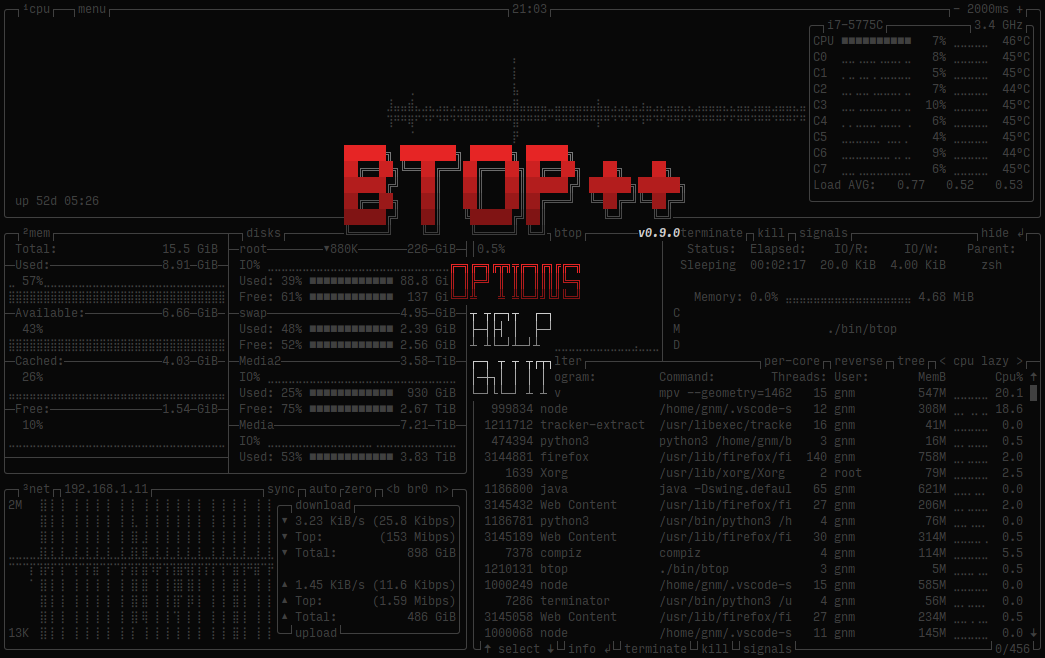root@mowa219-gjp4-8570p-freebsd:~ # mount | sort
/tmp on /compat/ubuntu/tmp (nullfs, local)
/usr/home on /compat/ubuntu/home (nullfs, local, noatime, nfsv4acls)
/usr/local/poudriere/data/.m/main-default/ref/rescue on /usr/local/poudriere/data/.m/main-default/01/rescue (nullfs, local, noatime, read-only, nfsv4acls)
/usr/local/poudriere/data/.m/main-default/ref/usr/lib32 on /usr/local/poudriere/data/.m/main-default/01/usr/lib32 (nullfs, local, noatime, read-only, nfsv4acls)
/usr/local/poudriere/data/.m/main-default/ref/usr/share on /usr/local/poudriere/data/.m/main-default/01/usr/share (nullfs, local, noatime, read-only, nfsv4acls)
/usr/local/poudriere/data/.m/main-default/ref/usr/src on /usr/local/poudriere/data/.m/main-default/01/usr/src (nullfs, local, noatime, read-only, nfsv4acls)
/usr/local/poudriere/data/.m/main-default/ref/usr/tests on /usr/local/poudriere/data/.m/main-default/01/usr/tests (nullfs, local, noatime, read-only, nfsv4acls)
/usr/local/poudriere/data/.m/main-default/ref/var/db/ports on /usr/local/poudriere/data/.m/main-default/01/var/db/ports (nullfs, local, read-only)
/usr/local/poudriere/data/packages/main-default/.building on /usr/local/poudriere/data/.m/main-default/01/packages (nullfs, local, noatime, read-only, nfsv4acls)
/usr/local/poudriere/data/packages/main-default/.building on /usr/local/poudriere/data/.m/main-default/ref/packages (nullfs, local, noatime, read-only, nfsv4acls)
/usr/local/poudriere/jails/main/rescue on /usr/local/poudriere/data/.m/main-default/ref/rescue (nullfs, local, noatime, read-only, nfsv4acls)
/usr/local/poudriere/jails/main/usr/lib32 on /usr/local/poudriere/data/.m/main-default/ref/usr/lib32 (nullfs, local, noatime, read-only, nfsv4acls)
/usr/local/poudriere/jails/main/usr/share on /usr/local/poudriere/data/.m/main-default/ref/usr/share (nullfs, local, noatime, read-only, nfsv4acls)
/usr/local/poudriere/jails/main/usr/src on /usr/local/poudriere/data/.m/main-default/ref/usr/src (nullfs, local, noatime, read-only, nfsv4acls)
/usr/local/poudriere/jails/main/usr/tests on /usr/local/poudriere/data/.m/main-default/ref/usr/tests (nullfs, local, noatime, read-only, nfsv4acls)
/usr/local/poudriere/ports/default on /usr/local/poudriere/data/.m/main-default/01/usr/ports (nullfs, local, noatime, read-only, nfsv4acls)
/usr/local/poudriere/ports/default on /usr/local/poudriere/data/.m/main-default/ref/usr/ports (nullfs, local, noatime, read-only, nfsv4acls)
/usr/ports/distfiles on /usr/local/poudriere/data/.m/main-default/01/distfiles (nullfs, local, noatime, nosuid, nfsv4acls)
/usr/ports/distfiles on /usr/local/poudriere/data/.m/main-default/ref/distfiles (nullfs, local, noatime, nosuid, nfsv4acls)
/var/cache/ccache on /usr/local/poudriere/data/.m/main-default/01/root/.ccache (nullfs, local, noatime, nfsv4acls)
/var/cache/ccache on /usr/local/poudriere/data/.m/main-default/ref/root/.ccache (nullfs, local, noatime, nfsv4acls)
august on /copperbowl (zfs, local, noatime, nfsv4acls)
august/ROOT/n250650-ef396441ceb-a on / (zfs, local, noatime, nfsv4acls)
august/VirtualBox on /usr/local/VirtualBox (zfs, local, noatime, nfsv4acls)
august/iocage on /copperbowl/iocage (zfs, local, noatime, nfsv4acls)
august/iocage/download on /copperbowl/iocage/download (zfs, local, noatime, nfsv4acls)
august/iocage/download/12.0-RELEASE on /copperbowl/iocage/download/12.0-RELEASE (zfs, local, noatime, nfsv4acls)
august/iocage/images on /copperbowl/iocage/images (zfs, local, noatime, nfsv4acls)
august/iocage/jails on /copperbowl/iocage/jails (zfs, local, noatime, nfsv4acls)
august/iocage/jails/jbrowsers on /copperbowl/iocage/jails/jbrowsers (zfs, local, noatime, nfsv4acls)
august/iocage/jails/jbrowsers/root on /copperbowl/iocage/jails/jbrowsers/root (zfs, local, noatime, nfsv4acls)
august/iocage/log on /copperbowl/iocage/log (zfs, local, noatime, nfsv4acls)
august/iocage/releases on /copperbowl/iocage/releases (zfs, local, noatime, nfsv4acls)
august/iocage/releases/12.0-RELEASE on /copperbowl/iocage/releases/12.0-RELEASE (zfs, local, noatime, nfsv4acls)
august/iocage/releases/12.0-RELEASE/root on /copperbowl/iocage/releases/12.0-RELEASE/root (zfs, local, noatime, nfsv4acls)
august/iocage/templates on /copperbowl/iocage/templates (zfs, local, noatime, nfsv4acls)
august/jails on /jails (zfs, local, noatime, nfsv4acls)
august/jails/12 on /jails/12 (zfs, local, noatime, nfsv4acls)
august/jails/13 on /jails/13 (zfs, local, noatime, nfsv4acls)
august/mkjail on /copperbowl/mkjail (zfs, local, noatime, nfsv4acls)
august/mkjail/12.0-RELEASE on /copperbowl/mkjail/12.0-RELEASE (zfs, local, noatime, nfsv4acls)
august/poudriere on /copperbowl/poudriere (zfs, local, noatime, nfsv4acls)
august/poudriere/data on /usr/local/poudriere/data (zfs, local, noatime, nfsv4acls)
august/poudriere/data/.m on /usr/local/poudriere/data/.m (zfs, local, noatime, nfsv4acls)
august/poudriere/data/cache on /usr/local/poudriere/data/cache (zfs, local, noatime, nfsv4acls)
august/poudriere/data/logs on /usr/local/poudriere/data/logs (zfs, local, noatime, nfsv4acls)
august/poudriere/data/packages on /usr/local/poudriere/data/packages (zfs, local, noatime, nfsv4acls)
august/poudriere/data/wrkdirs on /usr/local/poudriere/data/wrkdirs (zfs, local, noatime, nfsv4acls)
august/poudriere/jails on /copperbowl/poudriere/jails (zfs, local, noatime, nfsv4acls)
august/poudriere/jails/example on /usr/local/poudriere/jails/example (zfs, local, noatime, nfsv4acls)
august/poudriere/jails/main on /usr/local/poudriere/jails/main (zfs, local, noatime, nfsv4acls)
august/poudriere/ports on /copperbowl/poudriere/ports (zfs, local, noatime, nfsv4acls)
august/poudriere/ports/default on /copperbowl/poudriere/ports/default (zfs, local, noatime, nfsv4acls)
august/poudriere/ports/portoverlay on /copperbowl/poudriere/ports/portoverlay (zfs, local, noatime, nfsv4acls)
august/usr/home on /usr/home (zfs, local, noatime, nfsv4acls)
august/usr/ports on /usr/ports (zfs, local, noatime, nosuid, nfsv4acls)
august/usr/src on /usr/src (zfs, local, noatime, nfsv4acls)
august/var/audit on /var/audit (zfs, local, noatime, noexec, nosuid, nfsv4acls)
august/var/crash on /var/crash (zfs, local, noatime, noexec, nosuid, nfsv4acls)
august/var/log on /var/log (zfs, local, noatime, noexec, nosuid, nfsv4acls)
august/var/mail on /var/mail (zfs, local, nfsv4acls)
august/var/tmp on /var/tmp (zfs, local, noatime, nosuid, nfsv4acls)
august/vm-bhyve on /copperbowl/vm-bhyve (zfs, local, noatime, nfsv4acls)
devfs on /compat/linux/dev (devfs)
devfs on /compat/ubuntu/dev (devfs)
devfs on /dev (devfs)
devfs on /usr/local/poudriere/data/.m/main-default/01/dev (devfs)
devfs on /usr/local/poudriere/data/.m/main-default/ref/dev (devfs)
fdescfs on /compat/linux/dev/fd (fdescfs)
fdescfs on /compat/ubuntu/dev/fd (fdescfs)
fdescfs on /dev/fd (fdescfs)
fdescfs on /usr/local/poudriere/data/.m/main-default/01/dev/fd (fdescfs)
fdescfs on /usr/local/poudriere/data/.m/main-default/ref/dev/fd (fdescfs)
linprocfs on /compat/linux/proc (linprocfs, local)
linprocfs on /compat/ubuntu/proc (linprocfs, local)
linprocfs on /usr/local/poudriere/data/.m/main-default/01/compat/linux/proc (linprocfs, local)
linprocfs on /usr/local/poudriere/data/.m/main-default/ref/compat/linux/proc (linprocfs, local)
linsysfs on /compat/linux/sys (linsysfs, local)
linsysfs on /compat/ubuntu/sys (linsysfs, local)
procfs on /proc (procfs, local)
procfs on /usr/local/poudriere/data/.m/main-default/01/proc (procfs, local)
procfs on /usr/local/poudriere/data/.m/main-default/ref/proc (procfs, local)
tmpfs on /compat/linux/dev/shm (tmpfs, local)
tmpfs on /compat/ubuntu/dev/shm (tmpfs, local)
tmpfs on /tmp (tmpfs, local)
tmpfs on /usr/local/poudriere/data/.m/main-default (tmpfs, local)
tmpfs on /usr/local/poudriere/data/.m/main-default/01 (tmpfs, local)
tmpfs on /usr/local/poudriere/data/.m/main-default/01/.p (tmpfs, local)
tmpfs on /usr/local/poudriere/data/.m/main-default/01/usr/local (tmpfs, local)
tmpfs on /usr/local/poudriere/data/.m/main-default/ref (tmpfs, local)
tmpfs on /usr/local/poudriere/data/.m/main-default/ref/.p (tmpfs, local)
tmpfs on /usr/local/poudriere/data/.m/main-default/ref/var/db/ports (tmpfs, local)
root@mowa219-gjp4-8570p-freebsd:~ #

 github.com
github.com
